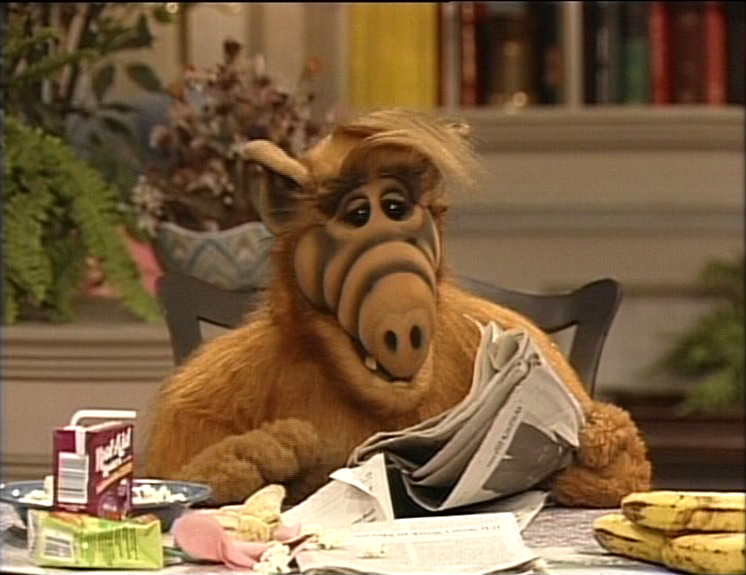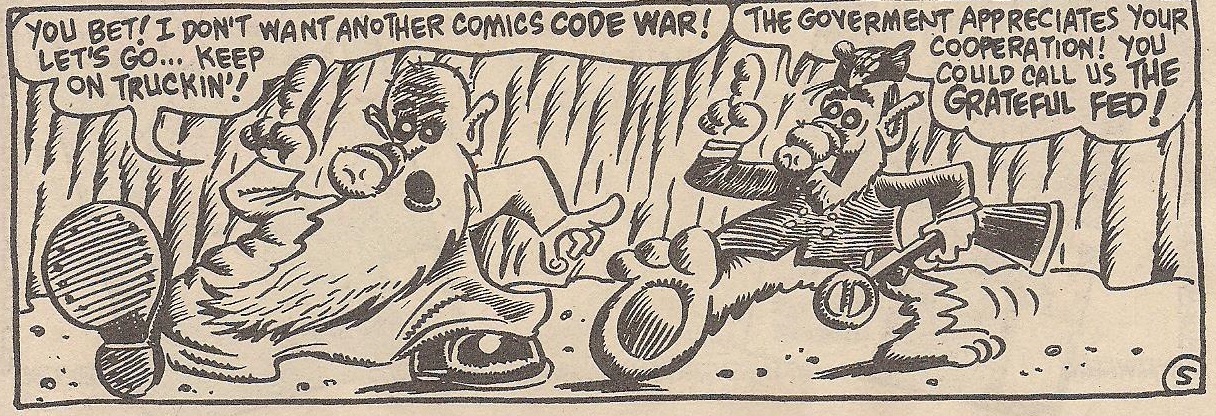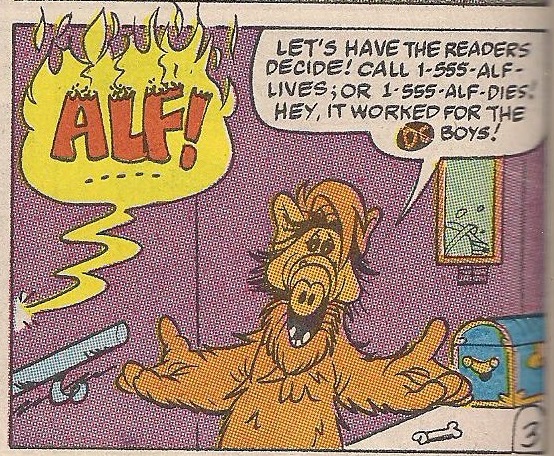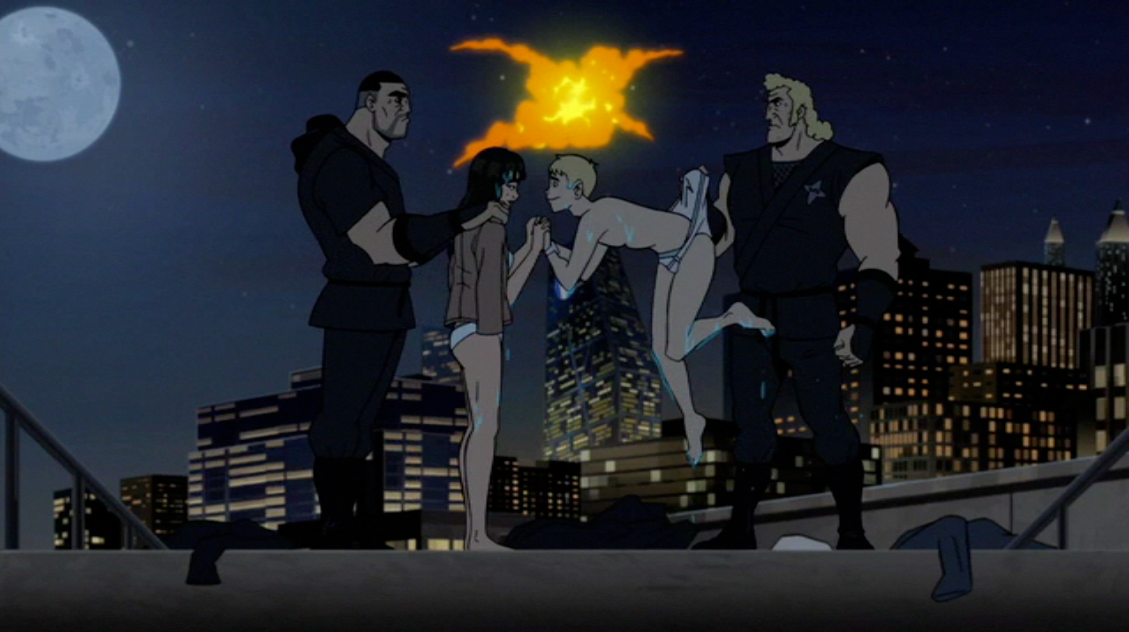Another season down, and while I wouldn’t call this experiment a failure, I look forward to a much more traditional season to follow. It was ambitious, but I don’t know that the ambition really came to anything.
I’ve been down on season six as a whole, and I know that. But it’s mainly because the one-long-story device meant that things were elevated to “important” status which wouldn’t have been otherwise. When you’re watching everything unfold over a (relatively) unbroken period of time, you’re going to see a lot of stuff happening just because the camera is already there. In a standard half-hour show you’ll only see things for good reason; there’s not time to dawdle. Here we saw entire plots — or what seemed to be plots — come to nothing, presumably just because we were hanging around while they happened.
For instance, the Science Now conference. We were led to believe Dr. Venture’s reveal of a new invention was of prime importance to him…but by the end of the season the conference doesn’t even happen. There’s Dean attending school…which led to nothing apart from the fact that we can now type “There’s Dean attending school.” Hank’s courtship of Sirena fared much better, but still hasn’t led anywhere. It’s been all setup. Largely good setup…but setup all the same.
The new characters were almost uniformly a bust. Of the mess of them introduced in “Hostile Makeover,” only Warriana made an impact. (More on her later). And one-off villains like Harangutan and Think Tank were almost daring in how thinly they were drawn. Wide Wale was probably the worst and most confusing of the bunch, as I still have no fucking idea what he’s doing.
He’s this season’s big bad…except that he isn’t, and he’s just kind of wading around, hoping Jackson or Doc figure out something for him to do. But we’ve had a whole season to figure it out and we still don’t know why he was driving a wedge between The Monarchs, or to what end, why he cared about arching (and then not arching) Dr. Venture, whether the murder of his brother plays into this, or…anything, really. The show went out of his way to establish him as an important character, and then did literally nothing with him. If season seven opened with him falling out a window to his death, I can’t imagine it’d register as any kind of loss.
The disappointing new characters are made more disappointing by the established characters we don’t get to see. No Orpheus, no Triad, no Impossibles, no Molotov…these are rich characters that, to varying degrees, we care about. To say we can’t cycle in new characters would be insane, especially as we have Red Death, Warriana, and, to a lesser extent, Sirena to prove that Jackson and Doc can still give us great new creations on a near-regular basis. It’s just that most of the new creations weren’t great, and the absence of other characters we love is too clearly felt.
Having said all of that, “Red Means Stop” was a lot of fun. And it was pretty good. Between this, “Maybe No Go,” “It Happening One Night,” and “A Party for Tarzan,” I’d say half of the season was solid.
The problem comes from the fact that the format — the lack of a proper structure, and, in many cases, the complete lack of payoff — hamstrung the rest of the episodes, and I really hope we’re done forcing everything in a single narrative that doesn’t actually go anywhere. Keep the Ventures in New York; I’m okay with that. But please return to a format more suited to weekly installments.
Okay, have I bitched enough about a show I love?
Good. Let’s get into the good stuff season six did, which, fortunately, ties pretty tightly into what “Red Means Stop” does.
For starters, I think the season absolutely nailed Gary’s emotional journey. Like so much else it lacked a resolution, but unlike so much else it brought us to a very intriguing place, and I’m very excited to see what the show does with it.
While it was his idea to pull this whole Blue Morpho stunt in the first place — a fact The Monarch reminds him of this week, for maximum needling — he’s gotten gradually more implicated in these deaths, against his own wishes. He started by accidentally killing somebody (importantly, it happened in the service of actual good, as he rescued Billy) and moved on to deliberate, premeditated murder.
…at least, that’s what The Monarch expected of him last week. Kidnap The Wandering Spider, take him out to the Pine Barrens, force him to place a call that would establish The Monarch’s alibi…and then execute him. Gary wasn’t happy about this…and he may not have even killed the guy. We saw him burying something, but it could have just been The Wandering Spider’s gadgetry. Gary likely found a way to do his boss’s bidding — and take a supervillain out of the game — without getting blood on his hands.
But, hey, “Red Means Stop” twists again. Uncomfortable with murder, Gary’s instead been kidnapping villains and keeping them locked away in the Morpho Cave. A much more humane way of eliminating their competition…
…except that it isn’t. The Saw homages were…well, I’ll be honest here: I liked the episode as a whole, but the Saw homages were little more than Saw homages. I didn’t see much of an interesting spin on them, even if I loved the fact that Gary unwittingly became a Jigsaw figure. He didn’t mean to hurt anybody. At all. He meant to keep them locked away, yes, but he thought he was keeping them fed and safe. His intention was to not kill them, and he ended up creating for them a much more harrowing, awful, torturous end than a straight murder would have been. In attempting to be a good guy, he became a worse guy.
The Venture Bros. has been fairly cruel to its characters before, but never — to my knowledge — had it gone quite that far into hopeless darkness. It’s impressive that so much Saw made it into The Venture Bros. without being significantly softened…but it’s still just Saw, with the worst things happening off camera.
But, man…that look on Gary’s face at the end…when he realizes not only that he’s killed again, but that he did the worst thing imaginable to people he never intended to hurt…
It reminded me of that incredible moment in “Return to Malice,” when he’s explaining to Hank and Dean why he’s on the warpath. He describes the circumstances surrounding the unforgivable murder of 24, only to realize in the process of speaking the words that he is responsible. He is the reason 24 died.
His face falls. His narration stops. He never meant any harm…but he caused harm. He’s been affected by that realization ever since.
And now he has more, worse unnecessary death on his conscience.
I don’t know where his character is going next. But he’s on a journey, and it’s potentially a great one. Does this push him over the edge, or make him shrink back? I honestly have no idea. Does anyone out there have any predictions?
Also, out of curiosity: do we think The Wandering Spider was in that room? I’d just imagined the guy walking home in the moonlight, glad to be alive, unseen during the conclusion of “A Party for Tarzan,” escaping into a second chance at life while we watched Dr. Venture escape into his own. But now I wonder if Gary tossed him in there instead, only for the guy to be partially devoured by an insane Maestrowave.
The sheer (suggested) violence and brutality of those scenes was interesting. This is a show that usually softens its blows with comedy, but there was no redeeming punchline for those poor villains…just the reveal that the craziest of them was dealt the longest chain. Death happens on this show, but rarely has a character’s end been so ruthlessly awful. So, yes, I liked the Saw stuff, even though I really wish it was more than just Saw stuff.
Speaking of “Just _____ Stuff,” Red Death repeating Liam Neeson’s Taken monologue word for word (as far as I could tell, anyway) was pretty disappointing. Once again, it was just “Here’s what happened elsewhere” with no interesting spin. That’s a shame, because, man, you’ve heard that speech often enough that you really need something extra to justify another reprise.
Instead it’s just Red Death repeating something he heard in a movie, I guess. And then Gary identifies it for us, which means these characters have seen Taken and we can’t really fall back on this being a fun coincidence.
It’s disappointing, because Doc Hammer is a strong enough writer that he could have given us a speech like that one which was more true to the character and the situation than one lifted wholesale from somebody else’s work. (Compare this to Hank’s Bull Durham speech in “It Happening One Night.” That had a recognizable origin as well as Venture-specific execution.)
Instead we have The Monarch and Gary terrified by a speech that’s been repeated so often it’s no longer terrifying. Give us something better than that. Jackson and Doc (as both writers and performers) are better than that. Clancy Brown as Red Death was terrifying, so it’s crazy to me that they didn’t believe in him or the situation enough to give him — and themselves — something original to work with.
There was a lot to love here, though, not the least of which being returns from Hunter and Shore Leave. (I fucking love Shore Leave.) The Guild / OSI teamup was great without being especially eventful, and it was sad to see both organizations turning their backs on former member Hatred so flatly. It was a good kind of sadness…the kind only a show like this, with such long and complicated interlocking histories for its characters can pull off. And we got to see Snoopy again, which was nice. (I fucking love Snoopy.)
Wrapping the whole thing up — this dangerous encounter with a truly dangerous villain — by having a few bad guys sit around and talk about their feelings gave this away as a Doc Hammer episode in the best possible way. It was a great ending, and while it lacked the punch of Gary’s arc, The Monarch is left in a really interesting place as well. Red Death doesn’t tell him to chill the fuck out and live life for a while…he tells him to burn Venture to the ground and crush his skull. And then chill the fuck out and live life for a while.
Red Death has found peace. Not as a villain, but as a human being. (If…that’s…what he is…) He’s been freed from genuine hatred and obsession simply because he killed what he hated and obsessed over. Now he can divide his professional life from his personal life…and everybody’s happier for it. He has a loving family, a great home, and can arch one night a year. For a horrifying demonic soul-stealing beast, he’s got his shit together.
The question is…will The Monarch get his shit together the same way?
Season six wasn’t great. It pains me to say that, but it’s true. The experiment dealt this stretch of episodes more handicaps than opportunities, but, on the whole, I think it made good on the opportunities it did have.
But, damn, I’m really looking forward to a more traditional season seven.
For now, just a few stray observations and talking points:
Warriana is great. Period. I love her character, and she’s yet another addition to The Venture Bros.‘ commitment to creating strong, well-rounded females. (They peaked with Dr. Girlfriend, but, man, any show would peak with Dr. Girlfriend. And I don’t think they’ve whiffed on any of them outside of Dr. Quymn.) She’s a great foil to Brock in a way similar to — yet distinct from — Molotov, and part of me is very excited by the prospect of the latter resurfacing in Brock’s life…now that he has a healthier relationship with the former. What an incredible conflict that could be.
Also, I’m pretty disappointed that Brock’s propensity for distraction didn’t come into play. It’s happened enough that I thought it was intentional, but the last few episodes just sort of ignored it entirely. (Granted, the guy was barely in last week’s.) I still wonder if that’s building toward some kind of payoff, or if it’s just an accident of the writing.
“Red Means Stop” also gave us a fun addition to the roster of Venture legacy titles: Scamp. Prior to this season I think we only had Captain Sunshine and Wonderboy being identities that are passed down through the generations. More recently, of course, we added Blue Morpho and Kano to that mix. Now we have Scamp. And it’s kind of adorable (in…y’know…a tragic way) that even dogs in this world have legacy titles. God knows how many Scooby-Doos Shaggy and the gang went through…
And, man, Action Man is a fucking dick, isn’t he? Not that we couldn’t have concluded that earlier, but…man. Prior to the whole grenade flashback and discussion of him killing a baby — he claims it was a werewolf…or at least an ocelot — I would have been hard pressed to decide who was worse for young Rusty to hang around with: him or Colonel Gentleman. Now I think it’s Action Man by a mile. Colonel Gentleman is no prince, but I think he’s out of his mind in a much less destructive way. Kind of makes you wonder why he made him Hank’s godfather.
Finally, we can piece together a little more about the fate of The Monarch’s father: evidently Jonas was busted up about his death, so it’s less likely that he killed the guy himself. Reanimating him as Vendata could even have been an act of supreme grief rather than hubris.
You know, that whole character’s development is pretty interesting, as first he was just a silhouette on the Council of 13. Later Jackson and Doc needed a face for him, so they retconned him into Vendata. Now we’re learning more about The Monarch’s father, so we again reimagine him as The Blue Morpho. By no means am I complaining, mainly because the revisions of the character have been handled so smoothly and intriguingly, but I find it interesting how much effective mileage they’ve gotten from somebody who literally began as a shape.
Oh wait, finally for real this time: Dr. Venture remembers Kano as his father’s mute bodyguard. In “O.R.B.” we learned that Kano’s silence was penance for taking from this world “a great man.” At the time we and Brock concluded he meant Jonas Sr. But now we know for sure that he was mute when Rusty was still a boy. Whose life did he take? Was it the original Blue Morpho?
Lots of questions, fewer answers, in true Venture Bros. tradition. In the same tradition, we now wait.
And wait.
And wait…










































































